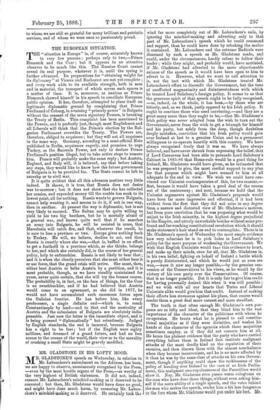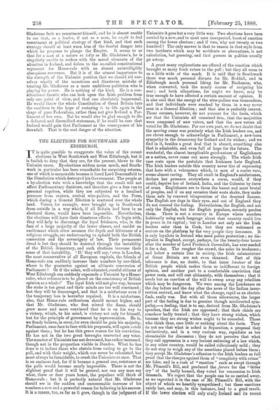MR. GLADSTONE IN HIS LOFTY MOOD.
MR. GLADSTONE'S speech on Wednesday, in relation to Mr. Labouchere's amendment on the Address, has been, we are happy to observe, unanimously recognised by the Press, —even by the most hostile organs of the Press,—as worthy of the very highest of British statesmen. It did not, indeed, censure Mr. Labouchere's mischief-making as it deserved to be censured ; but then, Mr. Gladstone would have done no good, and might have done much harm, by censuring Mr. Labou- chere's mischief-making as it deserved. He certainly took the wind far more completely out of Mr. Labouchere's sails, by ignoring the mischief-making and adverting only to that part of Mr. Labouchere's speech which he could commend and support, than he could have done by rebuking the malice it contained. Mr. Labouchere and the extreme Radicals were disarmed by such a speech as Mr. Gladstone made, and could, under the circumstances, hardly refuse to follow their leader ; while they might, and probably would, have mutinied, if Mr. Gladstone had adverted to the more objectionable animus of the speech as it would have been open to him to advert to it. However, what we want to call attention to is, not the tact with which Mr. Gladstone treated Mr. Labouchere's effort to discredit the Government, but the tone of unaffected magnanimity and disinterestedness with which he treated Lord Salisbury's foreign policy. It seems to us that the generous spirit of that speech ought to be fully recognised, —as, indeed, on the whole, it has been,—by those who are bitterly, and, as we think, justly opposed to his Irish policy. It ought to convince those who need convincing,—and they are a great many more than they ought to be,—that Mr. Gladstone's Irish policy was never adopted from the wish to turn out the Government, never from the wish to get a triumph for himself and his party, but solely from the deep, though doubtless deeply mistaken, conviction that his Irish policy would gain over Ireland at last to a genuine Union and to a permanent willingness to co-operate heartily with this country. We have always recognised freely that it was so. We have always believed, and have never shrunk from expressing the belief, that if Lord Carnarvon had been able to persuade Lord Salisbury's Cabinet in 1885-86 that Home-rule would be a good thing for Ireland, Mr. Gladstone would have given, as he intimated that he was prepared to give, the most cordial support to any plan for that purpose which might have seemed to him at all adequate to the end in view. We wish we could have con- vinced our Unionist contemporaries of this, for two reasons,— first, because it would have taken a good deal of the venom out of the controversy ; and next, because we hold that the Unionist arguments against Mr. Gladstone's proposals would have been far more impressive and effectual, if it had been evident from the first that they did not arise in any degree from a narrow and distorted view of Mr. Gladstone's motives, but from pure conviction that he was proposing what would be unjust to the Irish minority, in the highest degree prejudicial to the Empire, and utterly unworkable besides without some pro- found and far-reaching constitutional revolution which it should, make statesmen's hair stand on end to contemplate. There is in Mr. Gladstone's speech of Wednesday the most ample evidence how very reluctant he is to pick holes in Lord Salisbury's policy for the mere purpose of weakening the Government. We wish that English Unionists would tase this evidence to heart, and make up their minds, once for all, that Mr. Gladstone is, in his own belief, fighting on behalf of Ireland a battle which is purely disinterested, and which he would just as soon see won,—were it now any longer possible,—by the genuine con- version of the Conservatives to his views, as he would by the victory of his own party over the Conservatives. Of course, that is no longer possible. But it is only fair to give him credit for having personally desired this when it was still possible ; and we wish with all our hearts that Tories and Liberal Unionists alike would give him that credit. Instead of making their efforts less strenuous against his plans, that course would render them a great deal more earnest and more steadfast.
The truth is that often enough Mr. Gladstone's own pur- poses are so lofty and ideal, that they blind him to the vast importance of the character of the politicians with whom he co-operates. He trusts what he is pleased to call constitu- tional majorities as if they were divinities, and washes. his hands of the character of the agencies which these majorities sometimes employ, as if they did not concern him at all. He hears the plainest evidence that the party who have carried, everything before them in Ireland first institute malignant attacks of the most deadly kind on the reputation of their enemies, and then disown them with the utmost nonchalance when they become inconvenient, and he is no more affected by it than he was by the same class of attacks on his own Govern- ment, though if anything could show the recklessness of the policy of handing over Ireland to the care of an Irish Parlia- ment, this malignant unscrupulousness of the Parnellites would show it. Nay, Mr. Gladstone even passes warm eulogiums on the men who have done these things, without even asking him- self if the mere ability of a single speech, and the votes behind the man who makes the speech, render him a bit less dangerous to the foes whom Mr. Gladstone would put under his feet. Mr.
Gladstone feels no resentment himseli, and he is almost unable to see that, as a leader, if not as a man, he ought to feel resentment at political strategy of that kind, and that such strategy should at least warn him of the fearful danger into which he proposes to plunge the Empire. It seems to us that for a man of a nature so lofty as Mr. Gladstone's, he is singularly unable to reckon with the moral elements of the situation in Ireland, and defers to the so-called constitutional argument for Home-rule with an almost unintelligibly obsequious reverence. But it is of the utmost importance to the strength of the Unionist position that we should rid our- selves wholly of the monstrous and disastrous mistake of treating Mr. Gladstone as a mere ambitious politician who is playing for power. He is nothing of the kind. He is a con- stitutional fanatic who can look upon the Irish problem from only one point of view, and that one absolutely impersonal. He would throw the whole Constitution of Great Britain into the cauldron in the hope of restoring it to life again in the shape of pure Federalism, rather than not give Ireland a Par- liament of her own. But he would also be glad enough to die a defeated and discredited statesman, if he could be sure that Ireland would gain that Parliament as the consequence of his downfall. That is the real danger of the situation.







































 Previous page
Previous page